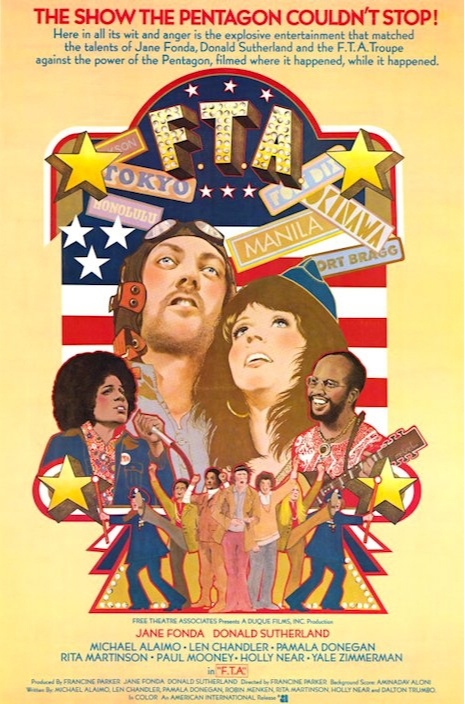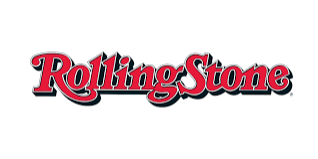
Donald Sutherland with Jane Fonda in FUCK THE ARMY
Donald Sutherland Was the Great Unsung Actor of the 1970s
Published June 21, 2024 / Rolling Stone Magazine

In an era that praised Method intensity and hair-trigger volatility, the lanky Canadian established himself the perfect post-hippie, age-of-paranoia star and helped define a decade. His versatility, however, was boundless and timeless.
BY DAVID FEAR
HE WAS INITIALLY an ambassador from the Hippie Nation, a force of irreverence armed with a sharp wit and a what-me-worry smile. Which is why, in the late 1960s, right when Flower Power was beginning to bloom in full and the escalating situation in Vietnam galvanized the youth generation, Donald Sutherland started to make a name for himself in… war movies. It’s funny to think of that factoid now, given the six decades of incredibly versatile work the late, great actor left behind when he died Thursday at the age of 88 — the only unifying factor between his peacenik heroes, period-piece Fascists, grieving fathers, flirty college professors, whistleblowers, space cowboys and dystopian dictators was the level of quality he put into portraying all of them. But while Sutherland would participate in a traveling show known as FTA (Fuck the Army) at the height of the counterculture’s radicalization period, he logged in a lot of time as a man in uniform in one of the most conservative genres around. How those films used this grinning, slightly zonked young man, however, would prove to be a stroke of genius. There is no better place to subvert than from within.
You do not get a more he-man WWII romp than The Dirty Dozen, the 1967 adventure with Lee Marvin, Robert Ryan, Charles Bronson, Jim Brown and overall dangerously high testosterone levels. Like the rest of the recruits, Sutherland’s Vernon L. Pinkley is a convict who’s chosen for a suicide mission, because what’s a felon got to gain but his freedom and lose except his life? This particular member of the Dozen is a little dim. And yet, Pinkley is the guy that the group’s leader picks to impersonate a General to fool the military brass. He passes on the offer. Except: This is not a request, soldier. So Pinkley, still in his grunt attire, plays along under duress and pretends to inspect the troops.
And here is where you first get a glimpse of why Sutherland, who’s already logged in a solid five years doing bit parts on TV shows and cheapo horror movies, will become not only a major actor but a star in the next few years. He shuffles toward the line of privates, but not before he glances over his shoulder and gives his fellow Dirties a loony, tongue-out look. Then, in just a few steps, Pinkley transforms himself from runt of the litter to a loose caricature of an officer and a gentleman. Head up, hands behind his back. He wonders aloud if these boys can really fight. Where you from, son? Madison City, Missouri, sir, replies one soldier. Pinkley shakes his head. “Neverrrr heard of it,” he says, before striding on.
Here was a guy mocking everything sacred about both the Greatest Generation’s legacy and the contemporary Army, the stand-in for every kid who worried about their draft number coming up and wondered “what are we fightin’ for?” He was the fly in your father’s-war-movie ointment, and would play a similar anachronism in the Clint Eastwood men-on-a-mission goof Kelly’s Heroes (1970) a few years later. But it was that same year’s M*A*S*H that cemented him as a proto–gross-out comedy hero, a sex symbol and a genuine above-the-title name. His Hawkeye Pierce and Elliott Gould’s Trapper John M.D. are a great double act, choosing gallows humor, pranks and the occasional happy-hour interlude as a way of celebrating life amidst a landscape of death. The movie took place during the Korean War, but y’know: wink, wink, wink. The movie struck a chord, and Sutherland was one of the main guys responsible for making that strummed chord resonate. Welcome to New Hollywood. Check your manners and your blind faith in institutions at the studio gate.
M*A*S*H would kick off a decade of American filmmaking Sutherland would partially come to define, even if the people who worship that glorious maverick era tend to go to the Method guys like Hoffman, Pacino and De Niro first. But from the bearded, Christ-like figures he played in movies like Alex in Wonderland and Little Murders (and actual Christ figure in Johnny Got Your Gun) to the white knight savior of Klute to the curly-mopped lead of Don’t Look Now and Invasion of the Body Snatchers, Sutherland slowly established himself as one of the era’s major players. This shot is now iconic, but even out of context, that hairdo and ‘stache alone virtually scream “the Seventies.” More importantly, Sutherland was the perfect actor for that moment in film history because he could seem sexy yet accessible, hip yet somehow out of touch, solid yet lost, steadfast yet disillusioned. As the counterculture started to recede into the distance, he could somehow come off as the embodiment of the Sixties hangover that was the Nixon/Ford years and the bartender gleefully serving the cocktails.
By the late 1970s, Sutherland was already playing authority figures like Professor Jennings in Animal House, the college teacher who may get kids stoned and has no moral issues regarding sex with his students, but is quick to remind them that they still have to turn in their papers on Paradise Lost. (“This is my job!”) When the odometer turned over into the 1980s, his first major role was in Robert Redford’s Oscar-winner Ordinary People, playing not just a numbed-by-grief dad but one half of the silver screen’s ultimate repressed-WASP parents. There were still romantic leads and cool cats ahead — we’re partial to his German spy in the underrated 1981 thriller Eye of the Needle — but Sutherland’s patriarchal phase would kick off in earnest now. Scroll through IMDb, and you’ll start to see “Dr.,” “Father” (as in priest) and “Sergeant” increasingly show up before his characters’ names. He’d also establish himself as a go-to guy when you needed someone to make an impact ASAP. His handle in Oliver Stone’s conspiracy-theorist nocturnal emission JFK (1991) is simply “X,” and Sutherland is only in one dense, dialogue-heavy scene on a bench. He’s still somehow the single most unforgettable element in that film.
He’d spend the last 30 years of his career as what we tend to call a “character actor,” gracing everything from teen horror comedies (the original Buffy the Vampire Slayer movie) to sports dramas (Without Limits), serial-killer thrillers (Citizen X) to tony literary adaptations (the 2005 take on Pride & Prejudice, where he turns Mr. Bennett’s climactic speech into a cinema du Jane Austen all-timer — he always claimed this was his favorite role). When he did get the chance to do more, in movies like Six Degrees of Separation (1993) or the FX limited series Trust (2018), you were reminded of how much he had to offer and the deft way he played the emotional scales. A generation will forever know him as President Snow, the grandfatherly embodiment of pure evil at the center of the Hunger Games franchise.
Yet no matter how small the part or how few the lines, Sutherland always knew how to snag you. He could use that singular, signature baritone to break your heart or make you involuntarily move your bowels. That twinkle in his eye, the same one you see in Vernon L. Pinkley’s eye when he decides to fully commit to hoodwinking the U.S. Army, never left Sutherland. He was an actor whose career spanned everything from the Pentagon Papers to QAnon, and whose permed visage really did become synonymous with a certain maverick moment in film history. It still feels like he never really got his due. Calling him anything less than one of the greatest screen actors of all time is, quite simply, getting it wrong. And Donald Sutherland was, by his own admission, someone who always went to great lengths to get it just right.

